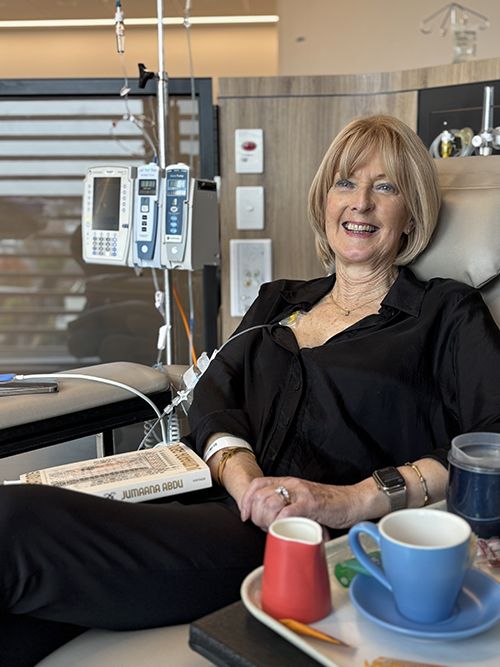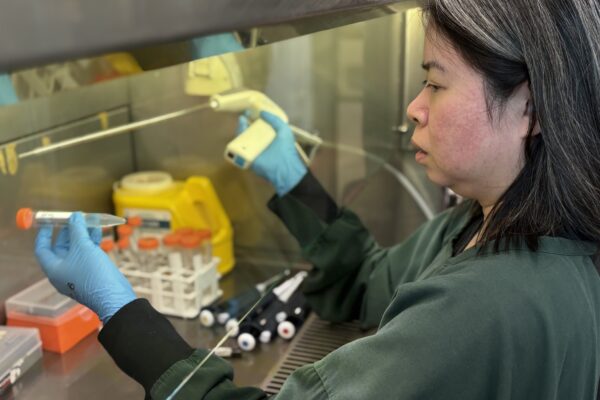Cabrini Cancer Institute creates national ovarian tumour library
10/06/2025

Helen Goode’s ovarian cancer diagnosis story is not unusual. She, like so many before her, discovered her cancer by accident following scans for an unrelated issue, with her cancer already at an advanced stage when diagnosed.
Ovarian cancer symptoms often only present once the cancer is advanced and spread. That’s why Cabrini Cancer Institute researchers are excited to have created Australia’s largest and only biologically comprehensive library of ovarian cancer organoids – 3D cancer models – which will help to shape the future of personalised cancer treatment for ovarian cancer patients.
Helen, a lecturer at the University of Melbourne, is having chemotherapy and immunotherapy treatment at Cabrini for her ovarian cancer, but she didn’t have to be asked twice to donate her ovarian cancer tumour cells to Cabrini Cancer Institute researchers to help establish this vitally important biobank.
“I was in Greece at a research conference,” Helen said about the events leading up to her diagnosis. “The night before we came home, I slipped on wet tiles and had a fall. I didn’t feel like I’d broken anything but two weeks later, I saw my osteopath, and she persuaded me to have an x-ray. I only had a hairline fracture, but my doctor persuaded me to have a bone density test.
“While there, I also mentioned to my doctor that I had been feeling bloated, so I was sent to have a CT scan, which is what picked up the mass.
“I probably would never have gone to the doctor for the bloating alone – it’s only that I was already there for the x-ray. The symptoms of ovarian cancer can be very similar to so many other things. That’s the scary thing about this disease. And that’s why I didn’t hesitate to say yes to donating my tissue to this new organoid program.
“It’s an opportunity to help contribute to important ovarian cancer research, which I hope one day will make significant advancements in the same way breast cancer survival rates have improved. I hope my diagnosis can help others.”
The establishment of the new Cabrini biobank of 3D ovarian cancer tumours will make the discovery of targeted and personalised ovarian cancer therapies a possibility, providing hope for patients of the disease that claims the lives of more than 1000 Australians every year.
The Cabrini Cancer Institute, in partnership with Monash University’s Biomedicine Discovery Institute (BDI), is building the library of ovarian cancer organoids – growing 3D cancer models of patients’ cancer tumours – to develop a process where doctors can use a patient’s own cancer cells to run personalised drug testing trials to ascertain which drugs might work.
Oncologist and Group Director of Cabrini Research, Professor Gary Richardson OAM, said the establishment of this biobank offers hope for the 1700-plus Australians diagnosed with ovarian cancer each year.
“We’re hopeful we can intervene earlier, with more targeted therapies that are personalised specifically for the patient,” Prof Richardson told the Herald Sun.
“The days of 10 people coming in with ovarian cancer and all being treated exactly the same are going to radically change over the next few years.
“The characteristics of each of their tumours will be quite different and so they’re going to end up having different drugs and different treatments and in doing that individually we’ll have much better outcomes.”
With the help of Cabrini’s gynaecological surgeons, our researchers are collecting ovarian cancer tissues from patients, then growing the organoids in the lab.
Cabrini Cancer Institute and BDI Papa Lab researcher, Dr Sylvia Mahara, said the new biobank will be accessible to researchers Australia-wide.
“These organoids are valuable pre-clinical models to study ovarian cancer, particularly their response to drug treatment,” she said.
“They can mimic patient-specific characteristics, allowing us to test various treatment strategies to find what works best for the patient’s specific type of tumour. This could make a significant difference to their survival outcomes and quality of life.”

Cabrini Cancer Institute and BDI Papa Lab researcher, Dr Sylvia Mahara
The new organoids program is made possible due to the recent expansion of the Cabrini Cancer Institute. Following a Federal Government grant, the integration of the Institute within Cabrini’s Malvern hospital allows researchers and clinicians to better collaborate and bring pioneering cancer research closer to the patients it serves.
Cabrini’s flagship genomic research programs are supported by generous Cabrini Foundation donors, with the aim of developing breakthroughs and delivering better health outcomes for all cancer patients.
This news was originally published in the Herald Sun.